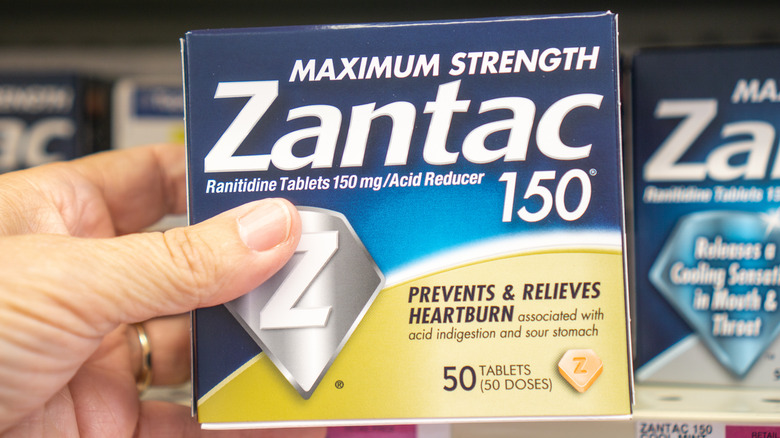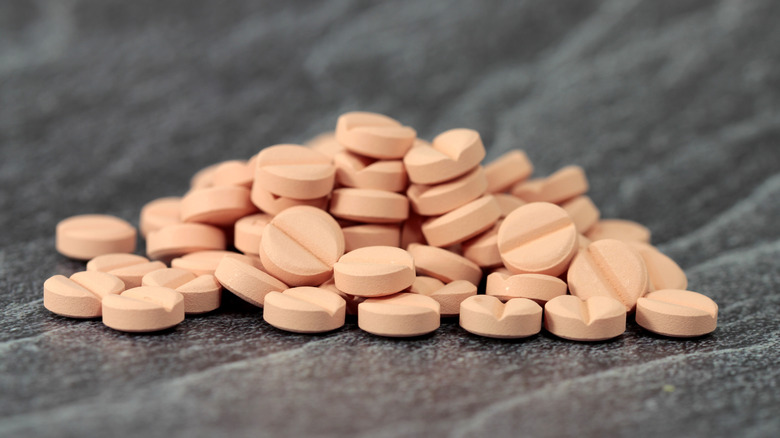The Real Reason Zantac Was Banned By The FDA
You've just enjoyed a delicious meal, and it was so good you finished everything on your plate. Shortly afterward, you feel a burning pain in your chest and panic. When you reach for your heartburn medication, you want it to help without worrying about what problems it may be causing.
If you've ever experienced heartburn, you know this situation well. It may be an infrequent inconvenience for some people. But according to WebMD, heartburn occurs about once a week for 20% of Americans and even more for pregnant women. Heartburn isn't actually a heart condition, but rather pain or burning in the middle of the chest that can rise into your throat. The feeling of pain and the area it occurs in make it frightening, as it may feel like a heart attack. Even worse, while it may only last a few minutes, it can carry on for hours.
Heartburn is actually esophagus related as stomach acid travels up and into the esophagus where it's not supposed to, causing irritation (per WebMD). Usually, the lower esophagus valve keeps this acid in check. However, certain factors can cause it to misfunction, such as obesity, pressure on the stomach, smoking, overeating, stress, and oily and fatty foods. To treat heartburn, you can reduce these factors with lifestyle changes or medicines to reduce stomach acid and acid production. Recently, though, one of the most well-known heartburn medicines has come under heavy scrutiny.
Zantac contains NDMA
Ranitidine is a medication known as a histamine-2 blocker used to treat conditions such as heartburn, sour stomach, too much stomach acid, acid indigestion, and gastroesophageal reflux disease (GERD) (via Medline). The more commonly known brand name of ranitidine is Zantac. Zantac has been available as an over-the-counter medication taken orally within an hour of eating to help prevent acid-related discomfort from occurring. Though some versions of the drug could be taken once a day, others required up to four doses daily.
Recently though, Zantac has been removed from the market by the U.S. Food and Drug Administration (FDA), reports Harvard Medical School. Consumers have also been instructed to stop taking any of this medicine they may have at home due to its dangers. The drug has been approved for almost forty years — but that doesn't change the results found by an independent lab. Though dangerous levels weren't found in every dose, a containment called N-Nitrosodimethylamine (NDMA) is present in ranitidine.
NDMA can cause cell damage
NDMA is a hepatotoxic contaminant that can damage liver cells and cause cancer (per Sage Journals). It was once used in producing sealants, lubricants, and rocket fuel but is now primarily a byproduct of chemical reactions that may be present in some products. While NDMA is known to be in some items currently consumed, such as fish, meats, fruits, vegetables, cereals, and medications, the FDA has a maximum level they believe is safe to consume.
NDMA occurs in products through contaminated water or soil used to feed or grow them and in materials used for production. It can also arise from an intermediate or active ingredient in the actual product, which is the case with ranitidine. According to a 2021 study, the FDA has set the acceptable level of NDMA to 0.096 micrograms or 0.32 ppm, but levels up to 9 times this amount were found in tested ranitidine products.
After the initial findings by the independent lab, another lab, Emery Pharma released a citizen petition to the FDA stating their findings, "... NDMA accumulates in ranitidine-containing drug products on exposure to elevated temperatures, which would be routinely reached during shipment and during storage. ... Hence, while NDMA levels in ranitidine may be acceptable at the source, they may not be so when the drug is purchased and subsequently at the time of consumption by the consumer." According to Sanofi, the manufacturer of Zantac, a new FDA-approved version with famotidine is now available.


